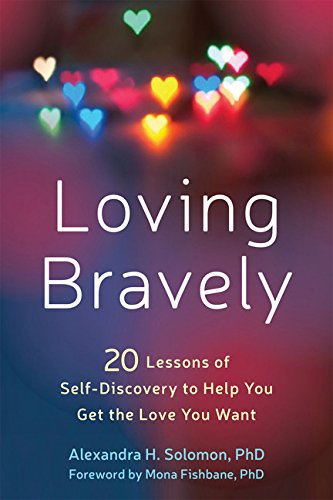
Below are 10 things we learned from reading Loving Bravely: Twenty Lessons of Self-Discovery to Help You Get the Love You Want by Alexandra H. Solomon PhD which you can get at:
https://www.amazon.com/Loving-Bravely-Twenty-Lessons-Self-Discovery/dp/1626255814
https://www.barnesandnoble.com/w/loving-bravely-alexandra-h-solomon/1124807870
https://www.indiebound.org/book/9781626255814
1. Your earliest experiences with relationships you observed and had with other people in childhood reflects and affects the way you approach relationships in adulthood, mostly without you even realizing it.
2. Your current approach to relationships aren’t set in stone, but changing things (if they were negatively affected by past experiences) requires you to engage in the possibly unpleasant (or worse) task of facing the past from an objective perspective – not acknowledging it at all doesn’t mean it goes away, rather it means that it stealthily continues to influence you.
3. Rebelling against a negative past can backfire if you misguidedly choose a seemingly opposite but ultimately reactionary and equally negative path, e.g. becoming a needy and clinging person in response to emotionally detached parents.
4. Problems in a relationship are rarely, if ever, entirely the fault of one party. It’s best to for both sides to look deep inside themselves to assess whether what they perceive as problematic in a partner are in fact mired in subjectivity arising from hurtful past experiences. It’s important though that the pendulum doesn’t swing to other way to blindly absolving the partner of any wrongdoing all the time.
5. While the past can’t be changed, your life story depends on how you interpret it – like how the atmosphere and plot of and entire movie can be changed completely depending on how it’s shot and edited.
6. There are emotional equivalents of “acquired food sensitivities” – paint points created from life experiences that are so deeply entrenched that you virtually forget about them, which actually gives them more power to disrupt your relationships with others.
7. Emotional responses, positive or negative, are an unavoidable part of life. It’s important to be honest about them while at the same time making sure they don’t overwhelm and control you by recognizing when that starts to happen, without necessarily suppressing them.
8. Anger is not inherently good or evil, but like an unpeeled pineapple it’s unpalatable and unpresentable without cutting it and reaching the soft fruit inside – the more vulnerable root emotion that you are afraid of sharing.
9. Rather than explicitly making demands in the relationship, reveal the emotions that make you want to make such demands, e.g. “I feel worried that you might cheat on me” rather than “I don’t want you to have opposite-gender friends!”. It’s important to do this without implying that they
caused you to feel this way.